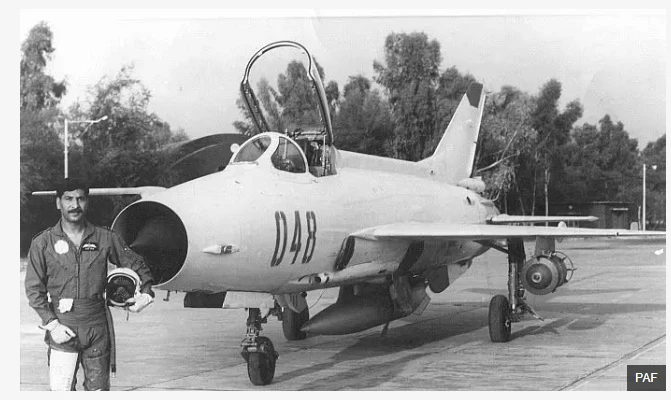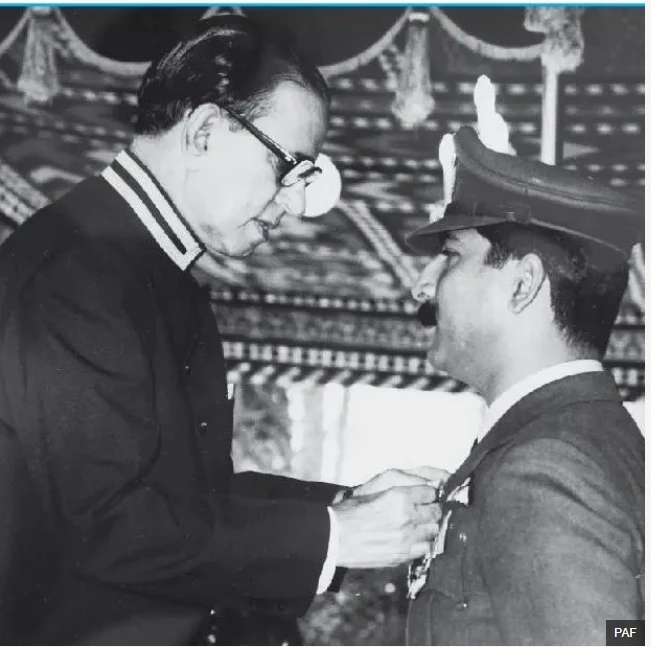When Pakistani pilot shot down Israeli fighter plane
By News Desk
April 27, 2024 04:12 PM

Representational image
“I don't know how many thoughts came to my mind that maybe the missile got stuck or something else happened. That one second was the longest moment of my life. Then suddenly the missile went off and it must have been two or three seconds when the missile hit the Israeli Mirage and I saw it explode.”
This incident happened exactly 50 years ago on April 26, 1974, when Pakistan Air Force pilot Flight Lieutenant Sattar Alvi shot down an Israeli fighter jet while flying a MiG fighter jet of the Syrian Air Force.
It was also a unique event of its kind because Pakistan pilots fought against Israel on behalf of the air force of another country which Pakistan does not diplomatically recognize. But how did Pakistani pilots reach Syria? To know the answer to this question, we have to go back five decades.
'Will you really fight?'
When the Arab-Israeli war broke out in October 1973, young pilot Sattar Alvi was part of a training course in Risalpur.
The pilots-in-training were often discussing the Arab-Israeli war in the evenings when the question arose of what they could do themselves.
Sattar Alvi said in an interview that 'I said that we are fighter pilots, we can offer to go voluntarily. No one said that will you really go and fight? I said yes. My roommate said I am with you too. Get up now.'
According to Sattar Alvi, it was midnight when 'we reached the house of the commandant of the academy. When he came out, we told hime the whole thing and he asked if they were coming from the bar. We said no, so he said to meet him in the office in the morning.'
https://www.youtube.com/watch?v=crtqEUMBVHo
The following day, the Pakistani pilots who volunteered to go to Syria were once again questioned at the commandant's office whether they were serious about their offer. Sattar Alvi says that 'We said absolutely. They asked us to wait for 10 minutes and then said to reach Peshawar, from there a plane will take you people.'
"Later we found out that the air chief of the air force spoke to Mr Bhutto, who contacted the Syrian president, Hafiz al-Assad, and he filled his support."
Sattar Alvi says that 'I took one of my shalwar kameez and flying gear and on reaching Peshawar we found that 14 other people were among those who volunteered. We were put in the Fokker plane, after a while the chief also arrived. We had no idea where we were going.'
'No official responsibility'
Another important thing that happened during this time was that the Pakistani pilots were given a paper and asked to sign it.

According to Sattar Alvi, it was written in this letter that we are going on holidays outside Pakistan and if something like this happens during that time, then the government of Pakistan or the Pakistan Air Force will not take responsibility for us, would have refused to recognize that we do not know this man.'
The Pakistani pilots were flown first to Karachi and then to Baghdad on a C130 plane. From Baghdad, Sattar Alavi and other pilots first travelled to Jordan and then to Damascus in road vehicles.
The total number of Pakistan pilots was 16, out of which eight were sent to Egypt while eight were instructed to stay in Syria. Sattar Alavi was among the eight pilots who remained in Syria.
Sattar Alavi and the other pilots were later flown to Damir Air Base, 30 minutes from Damascus, where they were designated Unit 67A.
One problem for Pakistani pilots was language. Sattar Alavi points out that the Russian-made MiG-21 aircraft of the Syrian Air Force were registered in Russian, while the radar and ATC spoke in Arabic. “We solved this problem by writing down the essentials we needed to fly and keeping them on a piece of paper in our flying suits which we wore all the time. The advantage of this was that we learned the Arabic language required for the need in a week.'
The Syrian unit of Pakistani pilots was entrusted with the role of air defence, whereby if any Israeli aircraft entered Syrian airspace, Pakistani pilots would be responsible for intercepting it. However, in the meantime, Egypt had agreed to a ceasefire with Israel, but the situation of war between Syria and Israel on the Golan Heights remained.
According to Sattar Alvi, 'We used to get ready every morning before dawn and wait at the airport. This routine continued for seven months.'
During this time, Pakistani pilots were sent into the air many times and many times they encountered Israeli planes but did not fight.
Shahbaz 8 vs Israeli Air Force
According to Sattar Alvi, 'Pakistani pilots thought that whether we shot down an Israeli plane or not, no Pakistani pilot should be shot down by the Israelis. Our air strategy was built under this ideology.'
April 26, 1974 started like any other day, but around 3:30 in the afternoon, the Pakistani pilots were assigned a routine defence mission.
According to Sattar Alvi, "When we were returning to the base after completing the mission, suddenly the radar informed about the presence of Israeli planes."
At that time, Pakistani pilots, including Sattar Alvi, had consumed most of the fuel in their plane, while suddenly the communication between them was cut off due to radar jamming.
Eight Pakistani pilots were flying in the Shahbaz 8 formation, with Sattar Alvi at the end. According to him, before the communication was lost, the formation commander instructed everyone to turn in the direction from which the arrival of the Israeli planes was reported.
It was in the atmosphere of Lebanon that meanwhile, Sattar Alavi saw a shining object towards the earth.
According to him, it was an Israeli Mirage warplane. At that moment, Sattar Alvi broke away from his formation and turned towards the plane.
According to him, during that time, 'that plane had passed near me but I saw another Mirage fighter plane behind it.'
‘As soon as this second plane passed me I used an aerial technique where the plane slows down to turn back towards it.’
“I noticed that the enemy aircraft had also started using the same technique we call 'scissors'. That is, the two planes are back and forth and turn left and right so as to reach the enemy's rear and target him.”
According to Sattar Alvi, at the same time, he stopped his plane in the air at zero speed for a moment, then the Israeli Mirage came in front of him. But now Sattar Alvi faced a problem. According to him, 'that plane was so close that if I had fired immediately, its debris would have fallen on my jet. I had to wait a bit to get a safe distance.'
But time was short as another Israeli fighter jet was now heading towards Sattar Alvi while Sattar Alvi's plane was also running out of fuel and they had to make a decision soon.

According to Sattar Alvi, the pilot of the Israeli fighter jet, Captain Lutz, saw his vulnerable position and tried to escape downwards. But the effort gave Sattar Alvi the safe distance he needed to fire.
Sattar Alvi chose to fire the Russian-made missile of the plane and pressed the button to fire it. But the missile did not go off.
It was less than a second in which Sattar Alvi says, 'I don't know how many thoughts crossed my mind that maybe the missile had stuck or something else had happened.'
In reality, the missile fires only after a delay of one second after pressing the button. For Sattar Alvi, that one second was the longest moment of his life. 'It must have been another two or three seconds before the missile hit the Israeli Mirage and I saw it explode.'
The entire skirmish was over in about 30 seconds, after which Sattar Alvi steered the plane towards the ground at supersonic speed, heading for his Syrian air base at a height of just 50 feet above the ground.
Meanwhile, when the jamming was over, Sattar Alvi informed the formation commander about the clash with the Israeli planes and headed for the runway.
The fuel gauge had gone below zero when Sattar Alvi's plane landed on the runway.
'There was no life in my legs'
Sattar Alvi says that 'as soon as I stopped the plane and switched off, I felt that the life had gone out of my legs.'
The crew on the ground had noticed that one of the plane's missiles was missing, but Sattar Alvi asked for a cup of tea as soon as he left the cockpit.
Sattar Alavi told the Syrian army about the location of the possible skirmish, after which Syrian soldiers in a helicopter went to the location where they found the wounded Israeli pilot, Captain Lutz, who was captured.
Sattar Alvi wanted to meet the Israeli pilot, but before that, Captain Lutz died of his injuries.
The Syrian government honoured Sattar Alvi with the country's highest honour while Israeli pilot Captain Lutz's flying gear was also given to him as a trophy.
According to Sattar Alvi, the government of Pakistan did not acknowledge this incident for many years. 'I also remained silent, if someone asked me, I would say that I have never been to Syria.' However, the Government of Pakistan also awarded Star of Courage (Sitar-i-Jurrat) to Sattar Alvi.–BBC







 New Iceland plant scales up CO2 removal from air
New Iceland plant scales up CO2 removal from air Sharmin Segal says NO to Salman Khan's marriage proposal
Sharmin Segal says NO to Salman Khan's marriage proposal Five more children die as death toll from measles in Dadu reaches 27
Five more children die as death toll from measles in Dadu reaches 27 Zuhab Khan and Wania Nadeem's love story culminates in heartfelt Nikah ceremony
Zuhab Khan and Wania Nadeem's love story culminates in heartfelt Nikah ceremony Ahmed Ali Akbar drops clue of ‘Parizaad’ Season 2
Ahmed Ali Akbar drops clue of ‘Parizaad’ Season 2 Fan kisses Durefishan Saleem at Ishq Murshid cinema screening
Fan kisses Durefishan Saleem at Ishq Murshid cinema screening





